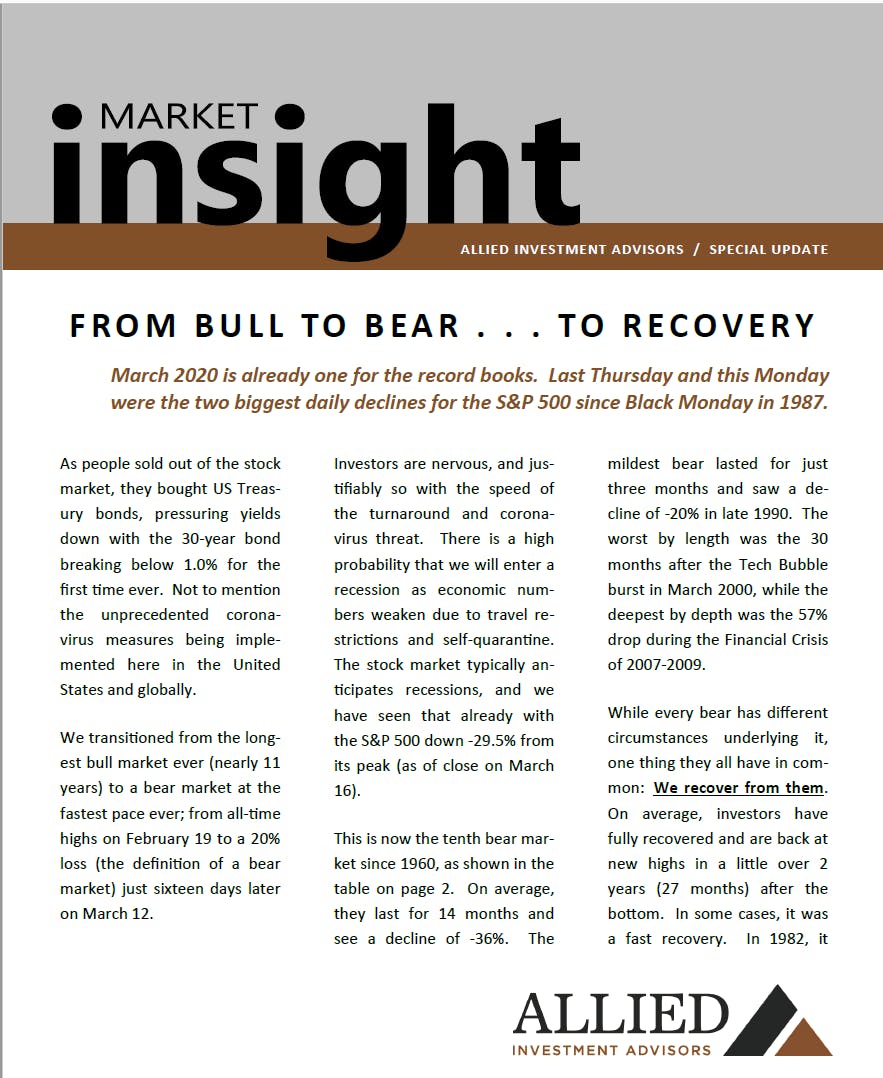Special Update: From Bull to Bear....To Recovery
March 17, 2020
March 2020 is already one for the record books. Last Thursday and this Monday were the two biggest daily declines for the S&P 500 since Black Monday in 1987.
As people sold out of the stock market, they bought US Treasury bonds, pressuring yields down with the 30-year bond breaking below 1.0% for the first time ever. Not to mention the unprecedented coronavirus measures being implemented here in the United States and globally.
We transitioned from the longest bull market ever (nearly 11 years) to a bear market at the fastest pace ever; from all-time highs on February 19 to a 20% loss (the definition of a bear market) just sixteen days later on March 12.
Investors are nervous, and justifiably so with the speed of the turnaround and coronavirus threat. There is a high probability that we will enter a recession as economic numbers weaken due to travel restrictions and self-quarantine. The stock market typically anticipates recessions, and we have seen that already with the S&P 500 down -29.5% from its peak (as of close on March 16).
This is now the tenth bear market since 1960, as shown in the table below. On average, they last for 14 months and see a decline of -36%. The mildest bear lasted for just three months and saw a decline of -20% in late 1990. The worst by length was the 30 months after the Tech Bubble burst in March 2000, while the deepest by depth was the 57% drop during the Financial Crisis of 2007-2009.
While every bear has different circumstances underlying it, one thing they all have in common: We recover from them. On average, investors have fully recovered and are back at new highs in a little over 2 years (27 months) after the bottom. In some cases, it was a fast recovery. In 1982, it took only 82 days to fully recover the loss. In 1990, it was 5 months. In other cases, it can take longer. After the Financial Crisis, it took 4 years to recover. Yet, in every single case, we recovered.

For someone with a more diversified portfolio, not just 100% in stocks, the recovery can come quicker. While we focus on high-quality stocks with strong dividends, having some fixed income exposure on top of that provides defensiveness in bear markets as well as cash flow for those already in retirement. This is why we recommend that investors keep 3-5 years’ worth of cash needs in bonds to safeguard spending during bear markets and recoveries.
A long-term focus is what helps investors survive gut wrenching drawdowns and stay the course for future compounding. During volatile times like this, it can be difficult to focus on recovery. One way to calm any stress you may be feeling is to review your financial goals. Knowing that your portfolio is well positioned will help you to sleep better at night, no matter what the market throws at us in the short-term. We would be happy to connect with you to review your investment objectives at any time.
If you have any questions about the market, your account, or just need an update, please reach out to any one of our team members at (406) 839-2037 to schedule a meeting.
The views expressed in this newsletter represent the opinion of Allied Investment Advisors, a Registered Investment Adviser. This material is for informational purposes only. It does not constitute investment advice and is not intended as an endorsement of any specific investment or services. The information provided herein is obtained from sources believed to be reliable, but no representation or warranty is made as to its accuracy or completeness. Investing in equity securities involves risks, including the potential loss of principal. While equities may offer the potential for greater long-term growth than most debt securities, they generally have higher volatility. International investments may involve risk of capital loss from unfavorable fluctuation in currency values, from differences in generally accepted accounting principles, or from economic or political instability in other nations. Past performance is not indicative of future results. Investments are not a deposit of or guaranteed by a bank or any bank affiliate. Please notify Allied Investment Advisors if there have been any changes to your financial situation or investment objectives or if you wish to impose or modify any reasonable restrictions on the management of your accounts through Allied Investment Advisors.

